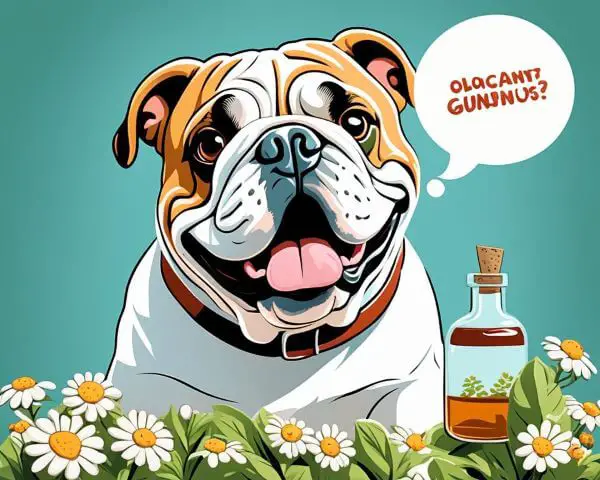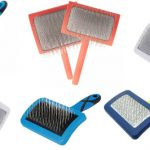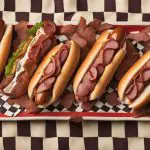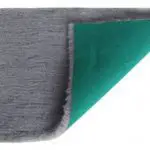Do you own an adorable bulldog but find yourself constantly battling their smelly gas? Are you tired of searching for effective remedies to combat the flatulence in your furry friend? Look no further! In this article, we will dive into the causes of bulldog farts and provide you with essential tips to reduce them and eliminate those unpleasant odors.

Say goodbye to the embarrassment and discomfort, and say hello to a more comfortable and gas-free bulldog!
Key Takeaways:
- Understanding the unique digestive system of bulldogs is crucial in addressing their farting issues.
- Common causes of bulldog farts include dietary factors and underlying health conditions.
- Improving your bulldog's diet by making modifications can help control excessive gas production.
- Identifying food triggers and eliminating them from your bulldog's diet is essential for managing gas.
- Regular exercise plays a significant role in maintaining a healthy digestive system for bulldogs.
Understanding Bulldog Digestion
Bulldogs have a unique digestive system that is prone to certain issues, which can contribute to increased gas production and farting problems. To effectively address these concerns, it is essential to gain a better understanding of their digestion.
Bulldog digestion issues can be attributed to several factors, including their anatomy and breed-specific traits. For instance, bulldogs have shorter and wider airways, which can result in excessive air swallowing during meals. This ingestion of air leads to flatulence and discomfort.
Additionally, bulldogs are known for their brachycephalic (short-nosed) features, which can cause respiratory difficulties and hinder proper digestion. This can result in inefficient breakdown of food, leading to an increase in gas production.
Furthermore, bulldogs are prone to gastrointestinal sensitivity and food intolerances, which can further exacerbate digestion problems. Identifying and addressing these underlying issues is crucial for managing bulldog farting problems.
By gaining insight into the unique digestive system of bulldogs, owners can make informed decisions regarding diet, feeding habits, and overall care to alleviate bulldog digestion issues and reduce farting problems.
Image:
Common Causes of Bulldog Farts
Bulldog farts can be a common and often smelly occurrence. Understanding the causes behind these flatulence episodes is essential for effective management. In this section, we will explore the various factors that contribute to bulldog farts, including dietary choices and underlying health conditions.
Bulldogs are known for their love of food, but certain dietary factors can lead to increased gas production. Foods high in fiber, such as beans and lentils, can be difficult for bulldogs to digest, resulting in more frequent and odoriferous flatulence. Additionally, feeding your bulldog low-quality or highly processed commercial dog food may also contribute to flatulence issues.
"The type of food we give our bulldogs plays a significant role in their digestive health and gas production," says Dr. Emily Johnson, a veterinarian specializing in canine nutrition. "Feeding them a balanced and easily digestible diet can help minimize flatulence."
Aside from diet, underlying health conditions can also contribute to bulldog farts. Bulldogs are prone to gastrointestinal issues such as food allergies, inflammatory bowel disease, and gastric disorders. These conditions can disrupt the normal digestive process, leading to increased gas production and smelly flatulence.
Understanding the common causes of bulldog farts allows us to take proactive steps in managing and reducing this smelly gas. By making informed dietary choices and addressing any underlying health concerns, we can create a more comfortable and odor-free environment for bulldogs and their owners.
In the next section, we will discuss how to improve bulldog diet to better control gas production and reduce flatulence episodes.
Improving Bulldog Diet for Gas Control
A key aspect of reducing bulldog farts is improving their diet. By making some simple modifications to their food intake, you can promote better digestion and lessen gas production. Here are some tips and recommendations to help you reduce your bulldog's farting problems and create a happier, less gassy pet:
1. Quality Food: Start by selecting a high-quality dog food that is easily digestible and specifically formulated for bulldogs. Look for options that contain natural ingredients and avoid fillers or artificial additives that can contribute to gas.
2. Slow Transition: When introducing a new food to your bulldog, do it gradually. Gradual transitioning can help their digestive system adjust to the changes and minimize the risk of gas and digestive upset.
3. Avoid Table Scraps: While it may be tempting to share your food with your bulldog, resist the urge to give them table scraps. Human food can be difficult for dogs to digest and can lead to increased gas production.
4. Monitor Protein Sources: Some proteins, such as beans, soy, or certain meats, can be harder for bulldogs to digest and may contribute to excessive gas. Pay attention to which protein sources your bulldog tolerates well and adjust their diet accordingly.
5. Limited Fiber: While fiber is an important part of a dog's diet, excessive amounts can lead to increased gas. Ensure that your bulldog's fiber intake is appropriate for their breed and individual needs.
6. Meal Frequency: Consider feeding your bulldog smaller, more frequent meals throughout the day. This can help prevent gulping and promote better digestion by allowing their system to process smaller amounts of food at a time.
7. Probiotics: Adding probiotics to your bulldog's diet can help improve their gut health and promote a healthy balance of bacteria, which may reduce gas. Consult with your veterinarian for recommendations on probiotic supplements suitable for your bulldog.
Tip: Remember that every bulldog is unique, and what works for one may not work for another. It's essential to monitor your bulldog's response to dietary changes and consult with your veterinarian for personalized advice.
By making these dietary adjustments, you can help reduce your bulldog's farting problems and improve their overall comfort. However, if your bulldog's gas issues persist or worsen, it's crucial to seek veterinary guidance for further evaluation and tailored recommendations.
Identifying Food Triggers
Certain foods can trigger excessive gas in bulldogs, leading to discomfort and smelly episodes. It's essential to identify these food triggers and eliminate them from your bulldog's diet to help manage their gas issues effectively.
Here are some common food triggers that can contribute to bulldog farts:
- High-Fiber Foods: Foods rich in fiber, such as beans, broccoli, and cabbage, can cause flatulence in bulldogs. While fiber is beneficial for digestion, excessive consumption can lead to increased gas production.
- Grains and Wheat: Some bulldogs may have sensitivities or allergies to grains and wheat, which can result in digestive upset and gas. Avoid feeding your bulldog foods that contain these ingredients.
- Dairy Products: Bulldogs, like many other dogs, can be lactose intolerant. Dairy products, including milk, cheese, and ice cream, can cause digestive issues and excessive gas. Limit or eliminate dairy from your bulldog's diet.
- Spicy Foods: Spices and spicy foods can irritate your bulldog's digestive system, leading to gas and discomfort. Avoid feeding your bulldog foods seasoned with spices or those that are too spicy.
- Low-Quality Dog Food: Low-quality dog foods may contain fillers, preservatives, and artificial ingredients that can disrupt your bulldog's digestion and cause excessive gas. Choose a high-quality, easily digestible dog food to help manage their gas issues.
Incorporating a variety of these foods into your bulldog's diet can help you identify which ones may be triggering their gas problems. Keep a food diary to track their meals and note any signs of increased flatulence after consuming certain foods.
Once you have identified the food triggers, take steps to remove them from your bulldog's diet:
- Eliminate Problem Foods: If you determine that specific foods consistently lead to excessive gas, remove them from your bulldog's diet completely.
- Introduce New Foods Gradually: When introducing new foods to your bulldog's diet, do so gradually. This approach allows their digestive system to adjust and reduces the likelihood of developing gas issues.
- Consult with a Veterinarian: If you're unsure about which foods to eliminate or need guidance in creating a balanced diet for your bulldog, consult with a veterinarian. They can provide expert advice tailored to your bulldog's specific needs.
By identifying and eliminating food triggers, you can help alleviate your bulldog's gas problems and improve their overall digestive health. Keep in mind that individual bulldogs may have different sensitivities, so it's essential to pay attention to their unique dietary needs.
Exercise and Its Role in Reducing Bulldog Farts
Regular exercise plays a vital role in maintaining a healthy digestive system for bulldogs. Not only does it help prevent weight gain, but it also stimulates bowel movements and aids in the overall digestion process. By incorporating physical activity into your bulldog's routine, you can effectively manage and reduce bulldog gas.
Exercise helps stimulate the muscles in the gastrointestinal tract, promoting the movement of food through the digestive system. This reduces the likelihood of constipation, which can contribute to excessive gas buildup. Additionally, physical activity improves blood circulation and oxygenates the body, which supports healthy digestion.
There are various ways to incorporate exercise into your bulldog's daily routine. Taking them for regular walks or engaging them in interactive play sessions can provide the necessary physical activity. Opt for activities that promote movement and engagement, such as playing fetch or running in a fenced-off area. Remember to consider your bulldog's age, health condition, and any specific exercise requirements they may have.
"Regular exercise plays a vital role in maintaining a healthy digestive system for bulldogs."
Bulldogs are known for their adorable wrinkled faces and friendly nature. However, they also have a tendency to develop digestive issues, which can result in excessive gas and discomfort. The good news is that by implementing regular exercise and promoting a healthy lifestyle, you can effectively manage and reduce bulldog farts.
- Dr. Emily Thompson, Veterinarian
It is important to note that exercise should be introduced gradually, especially if your bulldog is not accustomed to regular physical activity. Start with shorter walks and gradually increase the duration and intensity over time. Always monitor your bulldog's comfort level and adjust the exercise routine accordingly.
| Exercise Tips for Managing Bulldog Gas |
|---|
| 1. Walk your bulldog twice a day for at least 20 minutes each time. |
| 2. Incorporate interactive play sessions into their daily routine. |
| 3. Engage in activities that promote movement and engagement, such as playing fetch or running in a fenced area. |
| 4. Consider their age, health condition, and exercise requirements when planning physical activities. |
| 5. Gradually increase the duration and intensity of exercise to avoid overexertion. |
Exercise is a natural and effective way to manage bulldog gas. By providing regular physical activity, you can help regulate your bulldog's digestion and reduce the occurrence of smelly gas. Remember to consult with your veterinarian before implementing any new exercise routine, especially if your bulldog has any underlying health conditions.
Adoption of Slow Feeding Techniques
Bulldogs are notorious for eating quickly, which can contribute to excess air intake and gas. To promote better digestion and reduce gas-related issues, it is crucial to adopt slow feeding techniques. These methods help prevent gulping and allow Bulldogs to eat at a more relaxed pace.
Slow Feeding Bowls
One effective way to slow down a Bulldog's eating speed is by using specially designed slow feeding bowls. These bowls feature innovative patterns and obstacles that make it more challenging for dogs to consume their food quickly. By forcing Bulldogs to navigate around the barriers, slow feeding bowls encourage slower, more controlled eating habits. This reduces the amount of air they swallow, minimizing the likelihood of gas and digestion problems.
Food Dispensing Toys
Introducing food dispensing toys is another great strategy for slowing down a Bulldog's eating pace. These toys require dogs to work for their food by rolling, pawing, or manipulating the toy to release small amounts of kibble. Not only does this make mealtime more engaging and mentally stimulating, but it also extends the time it takes for Bulldogs to finish their meals. This helps prevent gulping and encourages a healthier eating speed.
Hand-Feeding
For Bulldogs that struggle with eating too quickly, hand-feeding can be an effective technique. Instead of placing the food in a bowl, hand-feed your Bulldog small portions of food at a time. This method allows you to control the pace at which your Bulldog eats, ensuring that they take their time and chew their food thoroughly. By closely monitoring their intake, you can prevent excessive air ingestion and minimize digestive issues.
Implementing these slow feeding techniques can significantly improve your Bulldog's digestion and reduce the occurrence of gas-related issues. It's important to remember that each Bulldog is unique, so find the method that works best for your furry friend. Taking steps to manage bulldog gas and promote healthy digestion will contribute to your Bulldog's overall well-being.
Seeking Veterinary Guidance
If your bulldog continues to experience persistent digestive issues and excessive farting despite implementing dietary changes and lifestyle modifications, it is crucial to seek professional guidance from a veterinarian. While certain gas-related problems in bulldogs can be managed at home, others may require the expertise of a veterinary professional.
A veterinarian will be able to diagnose any underlying bulldog digestion issues that might be causing the excessive farting problems. They can conduct a thorough examination, perform relevant tests, and provide a tailored treatment plan to address your bulldog's specific needs.
Veterinarians can help determine whether your bulldog's farting is a result of food allergies or sensitivities, digestive disorders, or other medical conditions. By analyzing symptoms and conducting tests, they can make an accurate diagnosis and recommend appropriate interventions.
Additionally, a veterinarian can offer insights into potential dietary adjustments you can make to alleviate your bulldog's farting problems. They may recommend specialized diets or specific ingredients to avoid. Veterinary guidance can also help differentiate between normal and excessive gas production, providing reassurance and expert advice.
When to Seek Veterinary Assistance
While occasional gas and farting are normal for bulldogs, there are certain signs that indicate the need for veterinary assistance. You should consult a veterinarian if your bulldog exhibits:
- Excessive or foul-smelling gas: If your bulldog's farting is particularly frequent, excessive, or emits a strong odor, it may be a sign of an underlying problem.
- Changes in appetite or weight loss: Loss of appetite or unexplained weight loss can indicate digestive issues that require professional attention.
- Vomiting or diarrhea: Persistent vomiting or diarrhea in conjunction with excessive farting may indicate a more serious condition that needs veterinary intervention.
- Abdominal discomfort or bloating: If your bulldog displays signs of discomfort, such as abdominal pain or bloating, it is important to involve a veterinarian to identify the cause.
- Other abnormal behaviors or symptoms: Any other abnormal behaviors, such as lethargy, excessive thirst, or changes in bowel movements, should also prompt you to seek veterinary guidance.
Remember, as a responsible dog owner, it is crucial to prioritize your bulldog's health and well-being. Seeking veterinary guidance can help in accurately diagnosing and addressing any underlying bulldog digestion issues or farting problems, providing your furry friend with the necessary care and support.
Signs for Seeking Veterinary Assistance
| Signs to Observe | Action |
|---|---|
| Excessive or foul-smelling gas | Consult a veterinarian for diagnosis and treatment |
| Changes in appetite or weight loss | Seek veterinary assistance to identify and address potential digestive issues |
| Vomiting or diarrhea | Involve a veterinarian to determine the underlying cause and provide appropriate care |
| Abdominal discomfort or bloating | Consult a veterinarian for a thorough examination and potential treatment options |
| Other abnormal behaviors or symptoms | Seek veterinary guidance to assess the overall health of your bulldog |
Natural Remedies for Reducing Bulldog Farts
In addition to making dietary changes, there are several natural remedies that can help reduce bulldog farts and improve their digestive health. These remedies, such as probiotics and digestive supplements, aid in promoting better digestion and reducing excessive gas production.
Probiotics:
Probiotics are beneficial bacteria that help maintain a healthy gut flora. They can be given to bulldogs in the form of supplements or incorporated into their diet through probiotic-rich foods. Probiotics work by balancing the gut microbiome and improving overall digestion, which can help reduce flatulence in bulldogs.
Digestive Enzymes:
Digestive enzymes are another natural remedy that can aid in reducing bulldog farts. These enzymes assist in breaking down food and enhancing nutrient absorption, which can alleviate digestive discomfort and minimize gas production. Digestive enzyme supplements can be introduced into the bulldog's diet after consulting with a veterinarian.
Herbal Remedies:
Some herbal remedies can also provide relief from bulldog farts. Ingredients like peppermint, fennel, and ginger have been traditionally used to soothe the digestive system and reduce flatulence. However, it's essential to consult with a veterinarian for guidance on the appropriate dosage and administration of herbal remedies for your bulldog.
It's important to note that while natural remedies can be beneficial, it's crucial to consult with a veterinarian before introducing any new supplements or treatments. The veterinarian can provide personalized recommendations based on your bulldog's specific needs and health condition.
Natural Remedies for Reducing Bulldog Farts
| Remedy | Description |
|---|---|
| Probiotics | Beneficial bacteria that promote a healthy gut flora and aid in digestion. |
| Digestive Enzymes | Enzymes that assist in breaking down food and improving nutrient absorption. |
| Herbal Remedies | Herbs such as peppermint, fennel, and ginger that soothe the digestive system and reduce flatulence. |
Conclusion
In conclusion, understanding the causes of bulldog farts and implementing effective strategies can significantly improve your bulldog's comfort and overall well-being. By paying attention to their diet, incorporating regular exercise, and considering their digestive health, you can successfully manage bulldog gas issues and minimize those pungent odors.
When it comes to controlling bulldog farts, diet plays a crucial role. Adjusting their food intake to include high-quality, easily digestible ingredients can help reduce gas production. Additionally, identifying and eliminating any food triggers can prevent uncomfortable episodes of flatulence.
Regular exercise is another key factor in managing bulldog gas. Physical activity helps promote healthy digestion and can reduce the frequency and intensity of farting incidents. Incorporate daily walks or play sessions to keep your bulldog active and maintain their digestive system in check.
If you have tried modifying their diet and exercise routine, and your bulldog is still experiencing excessive gas, it's important to seek veterinary guidance. A professional veterinarian can assess your bulldog's overall health and provide tailored advice or recommend further investigations if necessary.
FAQ
What causes bulldog farts?
Bulldog farts are typically caused by dietary factors, such as consuming gas-producing foods or having food allergies. Other common causes include gastrointestinal issues, such as sensitive stomachs, irritable bowel syndrome, or underlying health conditions.
How can I reduce bulldog farting?
To reduce bulldog farting, it's important to improve their diet by avoiding gas-producing foods like beans, cabbage, and dairy products. Additionally, feeding them smaller meals throughout the day and promoting slow feeding techniques can help prevent excess air intake. Regular exercise and adding natural remedies like probiotics or digestive supplements can also aid in reducing farting.
What can I do to manage bulldog gas?
Managing bulldog gas involves making dietary changes, such as avoiding foods that trigger gas and improving their overall diet. Additionally, incorporating regular exercise and slow feeding techniques can promote better digestion and minimize gas production. If the gas issues persist, it's advisable to seek guidance from a veterinarian to identify any underlying health conditions.
How can I identify food triggers for bulldog gas?
Identifying food triggers for bulldog gas involves monitoring your bulldog's diet and observing any patterns of increased farting after consuming certain foods. Common food triggers include grains, soy, dairy, and high-fiber foods. By eliminating these triggers from their diet and reintroducing them one at a time, you can pinpoint the specific foods that contribute to excessive gas.
Why is exercise important in reducing bulldog farts?
Regular exercise helps improve digestion for bulldogs by promoting movement in the gastrointestinal tract and reducing constipation. It also helps maintain a healthy weight, reducing the risk of digestive issues and excessive gas production. Incorporating daily exercise into your bulldog's routine can contribute to better overall digestion and minimized farting.
What are slow feeding techniques and how can they help?
Slow feeding techniques involve using specialized food bowls or puzzle feeders to slow down your bulldog's eating pace. Bulldogs tend to gobble their food quickly, which can lead to swallowing air and increased gas production. Using these techniques can prevent excessive air intake, improve digestion, and reduce farting problems in bulldogs.
When should I seek veterinary guidance for bulldog gas issues?
If you've made dietary changes, incorporated exercise, and implemented slow feeding techniques but your bulldog's gas issues persist or worsen, it's advisable to seek veterinary guidance. A veterinarian can assess their overall health, perform diagnostic tests if necessary, and provide specific recommendations to manage your bulldog's farting problems.
Are there natural remedies to reduce bulldog farts?
Yes, there are natural remedies that can help reduce bulldog farts. Probiotics, which promote healthy gut bacteria, can aid in digestion and minimize gas production. Digestive supplements, such as enzymes or herbal remedies, can also support better digestion and alleviate farting issues. Consult with your veterinarian for recommendations on specific natural remedies for your bulldog.
How can I improve my bulldog's diet for better gas control?
To improve your bulldog's diet for better gas control, consider feeding them high-quality, easily digestible, and limited ingredient dog food. Avoid foods that commonly trigger gas, such as grains, soy, and dairy. Gradually transition to the new diet to minimize digestive upset, and ensure they have access to fresh water at all times. Monitoring their response to the new diet will help you optimize their food intake for reduced farting.
Read my latest posts here:
- Golden Cavapoo Guide: Care, Training & TipsAs a devoted dog lover, I can't help but feel a sense of joy and fulfillment whenever I see a wagging tail and a pair of eager eyes looking up at me. Dogs have this incredible ability to bring light, love, and companionship into our lives, and one particular breed that has stolen my heart… Read more: Golden Cavapoo Guide: Care, Training & Tips
- Adopt a Rescue Cavapoo Today – Find Your Buddy!Imagine coming home to a wagging tail, a warm snuggle buddy, and unconditional love. That's the joy of having a furry friend by your side. But what if I told you that you could not only experience the purest form of companionship but also change a life in the process? By adopting a rescue cavapoo,… Read more: Adopt a Rescue Cavapoo Today – Find Your Buddy!
- Black Cavapoo Puppies: Your Adorable GuideImagine coming home to a furry ball of excitement, wagging its tail and eagerly waiting for your return. Picture the joy of cuddling up on the sofa with a playful companion who brings laughter and warmth to your life. This is the magic that black Cavapoo puppies can bring to your world. Whether you're a… Read more: Black Cavapoo Puppies: Your Adorable Guide
- Straight Hair Cavapoo Traits and Care GuideHave you ever dreamed of having a furry companion who is not only adorable but also hypoallergenic? Someone who will bring joy and love into your life without triggering pesky allergies or leaving a trail of fur behind? Well, let me introduce you to the straight hair Cavapoo, the perfect blend of cuteness and allergy-friendly… Read more: Straight Hair Cavapoo Traits and Care Guide
- Managing Dog Peeing from Anxiety - Quick TipsDoes your dog experience anxiety that leads to peeing accidents? If so, you're not alone. Many dog owners struggle with this issue, wondering how they can help their furry friends overcome their anxiety and prevent these unwanted accidents. But fear not, because in this article, we will provide you with quick and effective tips to… Read more: Managing Dog Peeing from Anxiety - Quick Tips
- Anti-Pull Dog Leash: Enjoy Tangle-Free WalksAre you tired of your dog constantly pulling and tugging during walks, making the experience more stressful than enjoyable? Do you wish there was a solution to make your walks together more peaceful and hassle-free? Say goodbye to those tangled leashes and strained arms because we have the answer! Introducing the revolutionary anti-pull dog leash,… Read more: Anti-Pull Dog Leash: Enjoy Tangle-Free Walks
- Dog Ate Aspirin? Immediate Steps to Take NowAs dog owners, we prioritize the well-being of our furry companions. But what happens when your beloved pet accidentally ingests aspirin? Do you know what immediate steps to take? Are you aware of the potential harm it can cause? Let's dive into this critical topic and learn how to safeguard your dog's health. Accidental consumption… Read more: Dog Ate Aspirin? Immediate Steps to Take Now
- Understanding Dog Aggressive Behavior with PeersDo you ever wonder why some dogs exhibit aggressive behavior towards their fellow canines? Is aggression towards other dogs a common problem or just a result of poor training? In this section, we will delve into the complexities of dog aggressive behavior towards other dogs and explore effective training methods to address this issue. By… Read more: Understanding Dog Aggressive Behavior with Peers
- Old English Bulldog vs. English Bulldog DifferencesWhen it comes to bulldogs, most people are familiar with the popular English Bulldog. However, there is another breed that often gets overlooked - the Old English Bulldog. These two breeds may share a similar name, but they have distinct differences that set them apart. So, what exactly are the key differences between the Old… Read more: Old English Bulldog vs. English Bulldog Differences
- Bulldog Farts: Causes and How to Reduce ThemDo you own an adorable bulldog but find yourself constantly battling their smelly gas? Are you tired of searching for effective remedies to combat the flatulence in your furry friend? Look no further! In this article, we will dive into the causes of bulldog farts and provide you with essential tips to reduce them and… Read more: Bulldog Farts: Causes and How to Reduce Them
- Bloodhound and Lab Mix Puppies: Adorable CompanionsAre you looking for an adorable companion that combines the best traits of two popular breeds? Meet the Bloodhound and Lab mix puppies, the lovable designer dogs that are capturing hearts everywhere. These unique crossbreeds are not only incredibly cute but also offer a variety of benefits that make them stand out from purebred dogs.… Read more: Bloodhound and Lab Mix Puppies: Adorable Companions
- AKC Bulldog Colors Guide - Identify Your PupHave you ever wondered why bulldogs come in such a diverse range of colors? From brindle and fawn to white and black, the coat colors of bulldogs are a fascinating subject. But how well do you know the official American Kennel Club (AKC) bulldog colors and standards? Are you confident in identifying the color genetics… Read more: AKC Bulldog Colors Guide - Identify Your Pup
- How many nipples does a dog haveHave you ever wondered how many nipples a dog has and what their purpose is? We will explore the anatomy of a dog's nipples, including how many nipples female and male dogs have. We will also discuss common nipple problems in dogs and how to tell if a dog's nipples are healthy. If you're curious… Read more: How many nipples does a dog have
- Best brush for a CavapooWhen you first bring your adorable little Cavapoo home, you’ll still be gathering all the things you need to take the best care of him or her. This post has been updated on 27th Feb 2024. One of the best brushes I’ve found is the Big G Slicker Brush by Chris Christensen. The longer pins… Read more: Best brush for a Cavapoo
- Meet the Unique Cavapoo with Blue Eyes - A Rare BeautyAs a professional journalist, I've had the pleasure of writing about various dog breeds, but the Cavapoo with blue eyes stands out as a true rarity. This captivating canine boasts striking blue eyes that add to its already unique charm. The Cavapoo breed with blue eyes is a sight to behold, with a playful personality… Read more: Meet the Unique Cavapoo with Blue Eyes - A Rare Beauty
- Comparing Breeds: Poochon vs Cavapoo - A Detailed InsightWhen it comes to selecting a new pet, many people find themselves deciding between the Poochon and Cavapoo breeds. While both are popular for their hypoallergenic qualities and suitability as family pets, there are distinct differences between the two that potential owners should consider. In this article, we will provide a detailed comparison of the… Read more: Comparing Breeds: Poochon vs Cavapoo - A Detailed Insight
- Adorable Newborn Cavapoo Puppies: A Must-Have CompanionGreetings! As a professional copywriting journalist, I am delighted to explore with you the irresistible charm of newborn Cavapoo puppies in this article. If you're a dog lover looking for a furry friend, you'll want to know how Cavapoo puppies make the perfect companions. Let's discover the joys of welcoming these adorable little bundles of… Read more: Adorable Newborn Cavapoo Puppies: A Must-Have Companion
- Meet the Adorable Ginger Cavapoo: Your Perfect CompanionIf you are in search of the ultimate companion that is both affectionate and adaptive, look no further than the ginger Cavapoo. These charming little dogs are a crossbreed between a Cavalier King Charles Spaniel and a Poodle, resulting in a lovable combination of traits that make them the perfect addition to any family. One… Read more: Meet the Adorable Ginger Cavapoo: Your Perfect Companion
- Your Guide to Adorable Ruby Cavapoo PuppiesWelcome to my comprehensive guide on ruby Cavapoo puppies! As a professional copywriting journalist, I have extensive experience researching and writing about different dog breeds. In this guide, we will explore everything you need to know about the adorable ruby Cavapoo, including their breed information, care tips, and why they make a perfect addition to… Read more: Your Guide to Adorable Ruby Cavapoo Puppies
- Overcoming Challenges: Why I Hate My Cavapoo & How To Love ItAs a Cavapoo owner, I know firsthand the challenges and frustrations that come with having this adorable breed as a furry companion. Despite their cute appearance and affectionate nature, Cavapoos can sometimes exhibit problem behaviors that lead to feelings of dislike and even resentment towards them. If you've ever found yourself saying "I hate my… Read more: Overcoming Challenges: Why I Hate My Cavapoo & How To Love It
- Unbiased Jonas Cavapoo Puppies Reviews: Happy Pet Parents Speak OutWhy Cavapoo Puppies are Highly Sought After As a professional copywriting journalist, I have had the opportunity to interact with many dog breeds. However, Cavapoos stand out as one of the most sought after breeds. But why? Cavapoo puppies are a perfect blend of the adorable, fun-loving, and affectionate attributes of a Cavalier King Charles… Read more: Unbiased Jonas Cavapoo Puppies Reviews: Happy Pet Parents Speak Out
- Explore Adorable River's Edge Cavapoos: Your Perfect Family PetAre you looking for a furry companion to bring joy and love into your family? If you're based in the US then you could take a look at River's Edge Cavapoos. Cavapoos are adorable puppies which are the perfect mix of Cavalier King Charles Spaniel and Poodle, resulting in a loving and gentle temperament that… Read more: Explore Adorable River's Edge Cavapoos: Your Perfect Family Pet
- Unveiling the Timeline: How Long for Cavapoo Hair to Grow BackAs a professional copywriting journalist, I often come across concerned Cavapoo owners wondering how long it will take for their pet's hair to regrow. The answer is not straightforward since several factors come into play in determining the time it takes for Cavapoo hair growth. In this section, I will explore the timeline for Cavapoo… Read more: Unveiling the Timeline: How Long for Cavapoo Hair to Grow Back
- Enjoy Comfort & Warmth with Equafleece Cavapoo Sweaters!As the temperature drops, it's essential to keep our furry friends warm and comfortable. The Equafleece Cavapoo Sweaters are a perfect solution to keep your Cavapoo cozy during the winter months. Equafleece is a renowned brand that offers high-quality dog fleece, including customized clothing for specific breeds, shapes and sizes, including our beloved Cavapoos. Equafleece… Read more: Enjoy Comfort & Warmth with Equafleece Cavapoo Sweaters!
- Can Puppies Look Like Their Grandparents? Unravelling the Mystery!Have you ever noticed a striking resemblance between your new puppy and their grandparents? Perhaps they share the same colouring or have similar facial features? It's not uncommon for puppies to resemble their grandparents, and in this article, I will explore the fascinating topic of whether this is possible and why it happens. We will… Read more: Can Puppies Look Like Their Grandparents? Unravelling the Mystery!
- Does Dewormer Make Puppies Pee More? Find Out Now!As a puppy owner, you may have concerns about the effects of deworming medication on your furry friend. One common worry is whether dewormer makes puppies pee more frequently. It's understandable to have questions about such changes in your puppy's urinary habits and how they may affect their well-being. In this article, we will provide… Read more: Does Dewormer Make Puppies Pee More? Find Out Now!
- When Do Puppies Require Less Supervision? A Detailed Guide.As a new puppy owner, it's important to keep a close eye on your furry friend. Puppies are curious and energetic, which means they require constant supervision to stay safe. However, as your puppy grows and develops, they will start to become more independent and require less supervision. But when exactly do puppies require less… Read more: When Do Puppies Require Less Supervision? A Detailed Guide.
- Can Dogs Eat Croissants? Your Query Answered Simply.As a dog lover, I am always concerned about my furry friend's health and well-being. It is essential to be aware of what we offer our dogs, especially when it comes to food. One of the most common questions pet owners ask is, "Can dogs eat croissants?" Croissants are a popular pastry that many people… Read more: Can Dogs Eat Croissants? Your Query Answered Simply.
- Delicious Pastrami Dogs: A British Twist on a Classic FavouriteAs a professional copywriting journalist, I have seen many trends come and go in the food industry. However, one dish that has captured my attention lately is pastrami dogs. These gourmet hot dogs are a British twist on a classic American favourite, and they are taking the culinary world by storm. Picture a juicy hot… Read more: Delicious Pastrami Dogs: A British Twist on a Classic Favourite
- Discover the Lovable Beethoven Dog Breed - All You Need to KnowAre you looking for a loyal and affectionate companion? Look no further than the Beethoven dog breed. These gentle giants are known for their charming personality and playful nature, making them the perfect addition to any family. With their distinctive features and friendly temperament, the Beethoven dog breed has become a popular choice among dog… Read more: Discover the Lovable Beethoven Dog Breed - All You Need to Know
- Understanding Behaviour: Why Do Female Dogs Put Their Bum on You?As a dog owner, you may have experienced the curious behaviour of a female dog putting her bum on you. While it may seem odd or even embarrassing, it's important to understand that this behaviour is a form of canine communication and can reveal a lot about your furry friend's instincts and personality. In this… Read more: Understanding Behaviour: Why Do Female Dogs Put Their Bum on You?
- Answering: How Many Dentastix Can a Dog Have a Day?As a dog owner, I'm sure you want to do everything possible to keep your furry friend healthy and happy. This includes taking good care of their teeth, which is essential for their overall health and well-being. One popular dental treat for dogs is Dentastix, but you may be wondering how many Dentastix can a… Read more: Answering: How Many Dentastix Can a Dog Have a Day?
- An Unexpected Bond: When My Dog Licked My EyeAs a dog owner, I thought I'd seen it all. But one day, my furry friend surprised me in a way I never could have imagined – by licking my eye. At first, I was taken aback and worried about the potential health risks. But as I looked into my dog's adoring eyes, I couldn't… Read more: An Unexpected Bond: When My Dog Licked My Eye
- Is Blue Cheese Safe? - A Guide to Blue Cheese for DogsAs a dog owner, it's natural to want to share your food with your furry friend. However, it's important to be cautious about what you feed them, as not all human foods are safe for dogs. One food that often raises questions is blue cheese. While it can be a delicious addition to our meals,… Read more: Is Blue Cheese Safe? - A Guide to Blue Cheese for Dogs
- What is Raw Feeding Dogs? Discover the Benefits & Basics.Hello, fellow dog lovers! I am thrilled to share with you the fascinating world of raw feeding for dogs. You may have heard of it before, but what exactly is raw feeding? Raw feeding refers to the concept of feeding dogs a diet of raw and unprocessed foods that mimic what their ancestors would have… Read more: What is Raw Feeding Dogs? Discover the Benefits & Basics.
- Uncover the Charms of Brown Fluffy Dog Breeds Today!Welcome to the world of brown fluffy dog breeds! These adorable and affectionate canines have captured the hearts of people around the globe with their cute, fluffy appearance and friendly personalities. In this article, we will explore the different types of brown fluffy dogs, provide tips on their care, and answer frequently asked questions about… Read more: Uncover the Charms of Brown Fluffy Dog Breeds Today!
- Best Vacuum Cleaner for Dog Hair UKWhen I was young I spent a lot of time at my grandparents house and they had four Bernese Mountain Dogs. Between them they kept my nan busy with daily brushing and she also used a pretty heavy duty vacuum cleaner! Now my dog "Bean" isn't nearly as bad as the double coated Bernese but… Read more: Best Vacuum Cleaner for Dog Hair UK
- Is Raw Feeding Dogs More Expensive? Let's Compare Costs.Hello, fellow dog lovers! As a dog owner, I am always on the lookout for the best ways to keep our furry friends happy and healthy. One question that often comes up in discussions about pet nutrition is whether raw feeding dogs is more expensive than traditional diets? Yes, raw feeding can be more expensive… Read more: Is Raw Feeding Dogs More Expensive? Let's Compare Costs.
- Can Dogs Eat Watercress? Discover the Answer & Benefits.As a dog owner, I am always looking for ways to provide my furry friend with a balanced and nutritious diet. One food item that has caught my attention recently is watercress. But can dogs eat watercress? Is it safe for them? In this section, I will explore the safety considerations associated with feeding watercress… Read more: Can Dogs Eat Watercress? Discover the Answer & Benefits.
- My Dog Ate 10mg of Loratadine: What to Do & Prevention TipsAs a dog owner, it's essential to be aware of potential dangers that your pet may face. One such danger is the ingestion of medication meant for humans. One day, I discovered that my dog had eaten 10mg of loratadine, an antihistamine commonly used to treat allergies in humans. I panicked and was unsure of… Read more: My Dog Ate 10mg of Loratadine: What to Do & Prevention Tips
- Dog Ate a Wasp: Remedies & Vet TipsIt happens to the best of us - our curious canine companion decides to snack on something they shouldn't. If your dog has eaten a wasp, it's important to take immediate action to alleviate any discomfort or potential health risks they may experience. In this guide, we'll explore the symptoms of a dog eating a… Read more: Dog Ate a Wasp: Remedies & Vet Tips
- Why Does My Dog Pant in the Car? Understanding Your Pet's BehaviorHave you ever noticed your dog panting heavily during car rides? Don't worry, it's a common behaviour for dogs. However, excessive panting can indicate discomfort or anxiety, which can make car rides stressful for both you and your furry friend. It's essential to understand your pet to ensure their well-being during car rides. Dogs pant… Read more: Why Does My Dog Pant in the Car? Understanding Your Pet's Behavior
- Can Puppy Eat Salmon? – A Friendly Guide to Feeding PuppiesWelcome to our friendly guide on whether it is safe for a puppy to eat salmon. As a pet owner, you want to ensure that your furry friend is receiving the best possible nutrition to support their well-being. Salmon is a nutritious fish that provides several health benefits for dogs, but is it safe for… Read more: Can Puppy Eat Salmon? – A Friendly Guide to Feeding Puppies
- Vet Bed UKThanks for checking out my review of the PnH Veterinary Bedding. I recently purchased the Vet Bed Rectangle measuring 76cm x 50cm in the colour Grey. It came ready to use, with the selvage edge already removed. Let me share my thoughts on this product with you! PnH Veterinary Bedding: Pros and Cons What We… Read more: Vet Bed UK
- Can Vet Bed Be Tumble Dried?As a pet owner, I know how important it is to provide our furry friends with comfortable bedding. Vet bed is a popular choice for many pet owners due to its softness and durability. However, one concern that often arises is whether or not vet bed can be tumble dried. Yes, Vet Bed can be… Read more: Can Vet Bed Be Tumble Dried?
- Can Dogs Eat Blue Cheese? Safety Tips & Risks ExplainedAs a dog owner, it is important to be mindful of the foods that you feed your furry friend. While some human foods are safe for dogs to consume, others can be potentially harmful. Blue cheese is one such food that has been a topic of much debate among pet owners. In this article, we… Read more: Can Dogs Eat Blue Cheese? Safety Tips & Risks Explained
- Can Dogs Eat Rocket LeavesCan dogs eat rocket leaves? This is a common question among dog owners who want to ensure the safety of their furry friends. Rocket leaves, also known as arugula, are a leafy green that is commonly used in salads and other dishes. In this article, we will explore whether rocket leaves are safe for dogs… Read more: Can Dogs Eat Rocket Leaves
- Understanding Why Does My Dog Feel Hot to The Touch - Ultimate GuideHave you ever touched your dog and noticed that they feel warmer than usual? It's natural to be concerned when you feel your dog's body temperature is higher than normal. In this section, we'll explore why your dog may feel hot to the touch. Firstly, it's essential to understand your dog's normal body temperature. A… Read more: Understanding Why Does My Dog Feel Hot to The Touch - Ultimate Guide
- Understanding the Lifespan: How Long Will a Cavapoo Live?Welcome to our informative guide on the lifespan of a Cavapoo. As a loving pet owner, you want to ensure that your furry friend has the best possible quality of life. Knowing how long your Cavapoo is likely to live is an essential aspect of planning for their long-term care. In this section, we will… Read more: Understanding the Lifespan: How Long Will a Cavapoo Live?
- Why Does My Dog Burp a Lot? Understanding Your Pet's Digestion!If you're a pet lover, you know that dogs can exhibit some pretty strange behaviours at times. One of these behaviours is excessive burping. While the occasional burp is normal, some dogs tend to burp more frequently than others, causing pet owners to wonder if something is wrong. In this section, we will explore the… Read more: Why Does My Dog Burp a Lot? Understanding Your Pet's Digestion!
- Essential Guide: What Should I Know Before Buying a Cavapoo?Are you considering bringing a Cavapoo into your home? These adorable pups are a popular mix of Cavalier King Charles Spaniel and Poodle, but before making a purchase, there are some essential things you should know. First and foremost, it's important to understand the care requirements, including grooming routines, nutrition needs, and exercise requirements. Additionally,… Read more: Essential Guide: What Should I Know Before Buying a Cavapoo?
- Your Guide to the Most Popular Grey Dog Breeds Out There!Grey dogs breeds are a beloved choice for many dog owners. Their unique coat colours and charming personalities make them stand out from the crowd. Whether you're after a small companion or a large, loyal friend, there are plenty of grey dog breeds to choose from. In this article, we'll take a closer look at… Read more: Your Guide to the Most Popular Grey Dog Breeds Out There!
- Is a Male or Female Cavapoo Better? Discover the Answer!Are you considering adding a Cavapoo to your family but unsure which gender to choose? Don't worry; you're not alone. Many potential pet owners find themselves asking the question, "Is a male or female Cavapoo better?" Fortunately, we're here to help you discover the answer. Before we dive into gender-specific characteristics, let's first understand the… Read more: Is a Male or Female Cavapoo Better? Discover the Answer!
- Is My Dog Depressed? Understanding Canine Blues & SolutionsAs a dog owner, you always want to make sure your furry best friend is happy and healthy. But what happens if you start to notice changes in their behaviour? Are they sleeping more than usual? Eating less? Not as playful as they used to be? You might be wondering, "is my dog depressed?" It's… Read more: Is My Dog Depressed? Understanding Canine Blues & Solutions
- Can Cavapoo be Left Alone? Understanding Your Pet's Needs.As a Cavapoo owner, you may wonder whether your furry friend can handle alone time. Understanding your pet's needs is crucial to ensure their well-being and happiness. Cavapoos are known for their affectionate and loyal nature, which means they thrive on human companionship. However, they're also adaptable and can adjust to periods of alone time… Read more: Can Cavapoo be Left Alone? Understanding Your Pet's Needs.
- Understanding Why is My Dog Licking Everything: A GuideAs a dog owner, you may have noticed that your furry friend has a tendency to lick everything in sight. From their paws to the furniture, excessive dog licking can be a cause for concern. In this guide, we will explore the various reasons behind why dogs engage in this behaviour and provide useful tips… Read more: Understanding Why is My Dog Licking Everything: A Guide
- Does a Cavapoo Smell? Decoding Your Pup's Unique ScentAs a Cavapoo owner, you know that these adorable pups are a joy to be around. However, you may have noticed a unique scent emanating from your furry friend. But does a Cavapoo smell? The answer is yes, just like any other dog breed, Cavapoos have an odour. But don't worry, there are ways to… Read more: Does a Cavapoo Smell? Decoding Your Pup's Unique Scent
- Best Dog Tug ToyFinding the right dog tug toy can be tricky. Durability, safety, and fun are all key factors to consider. From ropes to rubber toys, there are plenty of options. Tug toys can provide hours of entertainment and exercise. Plus, they can help strengthen the bond between you and your pet. Different shapes and sizes cater… Read more: Best Dog Tug Toy
- Carrots for Puppies Teething: A Natural Solution for Pain ReliefWhen your little furry friend is going through the teething process, it can be a challenging time for both of you. Thankfully, there are natural remedies that can help relieve their pain while promoting overall health. One such remedy is carrots for puppies teething. Carrots are an excellent source of vitamins and minerals that can… Read more: Carrots for Puppies Teething: A Natural Solution for Pain Relief
- Addressing Cavapoos Problems: What You Should KnowWelcome to our guide on Cavapoos! These adorable furry companions are known for their friendly and loving nature, but just like any other breed, they may encounter certain problems. In this section, we will discuss the common problems faced by Cavapoos, including their health issues and other challenges. It is important for prospective and current… Read more: Addressing Cavapoos Problems: What You Should Know
- Can My Dog Smell Other Dogs on Me? Unleashing Furry Facts!Welcome to the world of canine scent detection. If you're the proud owner of a furry friend, you may be wondering whether your dog can smell other dogs on you. Well, the answer is yes! Dogs have a remarkable sense of smell that allows them to detect scents that are beyond our human capabilities. Research… Read more: Can My Dog Smell Other Dogs on Me? Unleashing Furry Facts!
- Decoding the Price: How Much Should a Cavapoo Cost?Are you considering adding a Cavapoo to your family but unsure about the cost? We understand that the pricing of Cavapoos can vary greatly, making it challenging to determine what you should be paying. In this article, we'll explore the various factors that affect the cost of a Cavapoo, including health checks, pedigree, and breeder… Read more: Decoding the Price: How Much Should a Cavapoo Cost?
- Discover the Best Dog Brush for Corgis - Keep Their Coat Shiny!As a corgi owner, you know how important it is to keep your furry friend looking and feeling their best. One of the most crucial aspects of corgi grooming is brushing their coat regularly. Not only does this help to keep their fur free from tangles and mats, but it also promotes healthier skin and… Read more: Discover the Best Dog Brush for Corgis - Keep Their Coat Shiny!
- Cavapoo vs Cockapoo: What's Better? Explore Your Pup Choice!Choosing a furry friend to join your family can be a challenging decision, especially when it comes to the popular Cavapoo and Cockapoo breeds. Both are a combination of two adorable purebreds, making them highly sought after for their charming looks and loving personalities. If you're wondering "what's better Cavapoo or cockapoo," you're not alone.… Read more: Cavapoo vs Cockapoo: What's Better? Explore Your Pup Choice!
- Uncovering the Truth: Are Cavapoos Good Temperament Dogs?Welcome to our guide on Cavapoo temperament! If you're considering getting a Cavapoo, or just curious about their temperament, you've come to the right place. In this article, we'll explore the personality and behaviour of this adorable breed. Many people wonder, "Are Cavapoos good temperament dogs?" The answer is a resounding yes! Cavapoos are known… Read more: Uncovering the Truth: Are Cavapoos Good Temperament Dogs?
- Do Cavapoos Bark a Lot? Your Guide to Understanding Cavapoo BehaviorAre you considering getting a Cavapoo or already own one? One of the most common questions asked about these adorable pups is: do Cavapoos bark a lot? Cavapoos can be moderately vocal, their tendency to bark depends on their individual personality. Early training will certainly help manage excessive barking. As with any dog breed, Cavapoos… Read more: Do Cavapoos Bark a Lot? Your Guide to Understanding Cavapoo Behavior
- Unveiling the Truth: Do Cavapoos Make Good Pets?Yes, Cavapoos make good pets. They're known for their friendly and sociable nature. They are a crossbreed of Cavalier King Charles Spaniel and Poodle, combining the affectionate nature of the former with the intelligence of the latter. Obviously my opinion may well be biased as I absolutely love my Cavapoo, he's called Bean. That said… Read more: Unveiling the Truth: Do Cavapoos Make Good Pets?
- HOTTERdog by Equafleece Fleece Dog Coat ReviewWhat is the HOTterdog by Equafleece® Fleece Dog Coat? It's the perfect coat for your stylish dog! The HOTterdog by Equafleece® Fleece Dog Coat is made from 100% recycled materials and is lined with cozy fleece to keep your pup warm all winter long. This animal attire is also reversible, so you can choose between… Read more: HOTTERdog by Equafleece Fleece Dog Coat Review
- When Can Puppies Travel by Car?Puppies can travel by car at any age as long as you’re sensible about it. The younger they are the more considerate you should be. In this article I try to cover all the possible options and things you should consider. Can newborn puppies travel in a car? Whoa there, let's not jump the gun!… Read more: When Can Puppies Travel by Car?
- Merle CavapooDiscover the enchanting Merle Cavapoo, a delightful crossbreed with a splash of colour. Unleash joy and beauty with this charming companion. Find out more now! Key Takeaways: Merle Cavapoo Introduction The Merle Cavapoo is a highly sought-after breed that combines the intelligence of the Poodle with the affectionate nature of the Cavalier King Charles Spaniel.… Read more: Merle Cavapoo
- Equafleece ReviewDiscover how Equafleece can keep your dog cosy and fashionable all year-round. Read my Equafleece review for insights on this all weather-resistant dog fleece. I’ve bought more than one product from Equafleece for my Cavapoo “Bean” so this review is based on my personal experience. Below I give my overall “Best Buy” a cheaper alternative… Read more: Equafleece Review
- Cavapoo UnderbiteExplore the causes and solutions for underbites in Cavapoos. Learn how to care for your pet's dental health and ensure their long-term wellbeing. The posh word for "Underbite" is "Malocclusion" but I always try to use simple plain language in my blog posts whenever possible. If you read through this I'm confident you'll have a… Read more: Cavapoo Underbite
- Can a Bichon Frise have Straight Hair?Yes, it is possible for some Bichon Frises to have straight hair, but it is not the norm for the breed. Most Bichon Frises have curly or wavy hair. Introduction: Exploring the possibility of Bichon Frises having straight hair Bichon Frises have fluffy curls, but it's possible for some to have straight hair too. This… Read more: Can a Bichon Frise have Straight Hair?
- Can I take my Dog to France on the Ferry?Yes, you can take your dog to France by ferry. We have details here of specific requirements, such as vaccinations and documentation for traveling with pets. Introduction To gain an understanding of the topic "Can I take my dog to France on the ferry from UK?", let's start with a brief overview. We'll explore the… Read more: Can I take my Dog to France on the Ferry?
- How long do puppies need milk?Puppies typically need milk as their primary source of nutrition until they are around 4 to 6 weeks old. After that, they can gradually transition to solid food, but it's essential to consult a vet for guidance on the appropriate time to introduce solids to ensure the puppies' needs are met. Welcoming a litter of… Read more: How long do puppies need milk?
- Can ultrasound be wrong about puppies?Yes, ultrasound can sometimes be wrong about the number of puppies expected. Factors like foetal position, maternal tissue interference, or early gestation can affect the precision of the ultrasound results. Check with a vet for the most accurate assessment. Bringing new puppies into the world is an exciting time for dog owners and breeders. One… Read more: Can ultrasound be wrong about puppies?
- Why does a mother dog lay on her puppies?A mother dog lays on her puppies to provide warmth, comfort, and security. This behaviour is promoted by the release of oxytocin and prolactin, which awaken a mother’s protective instincts. Laying on her puppies helps regulate their body temperature and promotes bonding. When a dog mum gives birth to puppies, it’s a super exciting time,… Read more: Why does a mother dog lay on her puppies?
- Do puppies have rabies when they are born?No, puppies are not born with rabies. Rabies is a viral disease transmitted through the bite of an infected animal or, very rarely, through a mother’s milk if the mother carries the disease. It's crucial to vaccinate puppies to protect them from this potentially deadly disease. In the rest of this piece, we’ll explore if… Read more: Do puppies have rabies when they are born?
- Do puppies stop moving before birth? Yes, absolutely puppies often do stop moving before birth. Later in pregnancy, puppies are likely to move more to get into the proper position for delivery. After that, puppies usually settle and stop moving. Preparing for the birth of new puppies can be as challenging as it is exciting. You know there’ll be cuteness in… Read more: Do puppies stop moving before birth?
- What do breeders do with unsold puppies?When ethical breeders have unsold puppies, they may explore various options such as advertising, reducing prices, or giving them more training. They may also seek reputable homes through adoption, or work with rescue organisations to ensure the puppies find suitable, loving homes. Breeding can be tremendously rewarding. With litters of anywhere from a single pup… Read more: What do breeders do with unsold puppies?
- Do puppies bark more when teething?Yes, puppies do bark more when teething. The discomfort and pain caused by teething can lead to increased restlessness and irritability, making them bark more often. You can use teething toys and soothing remedies to help relieve their discomfort and curb their barking. Puppies are known for their adorable antics and playful nature. You may… Read more: Do puppies bark more when teething?
- When do puppies become affectionate? Puppies start showing affection as early as a few weeks old. However, the timing depends on their personalities, socialisation, and bond with their owners. Most puppies develop increasing affection as they grow and form stronger emotional connections with their owners. Just as with us humans, puppies go through emotional development as they grow. In their… Read more: When do puppies become affectionate?
- Is birch tree milk good for puppies? The benefits of birch tree milk for puppies are not well known, though the answer is yes, in moderation. If in doubt, it’s best to provide them balanced commercial puppy food formulated to meet their specific nutritional needs to keep your pup healthy. Puppies are bundles of joy. I can testify to that fact because… Read more: Is birch tree milk good for puppies?
- Can you use puppy pads for babies?While not toxic to babies, puppy pads are designed for training puppies to do their business indoors and should not generally be used for babies. Instead, use specialised baby changing pads that are safe and hygienic. It may seem an outlandish idea to use puppy pads for babies, because we all know how important it… Read more: Can you use puppy pads for babies?
- Do puppies lose weight after birth?Unravel the mystery: Do puppies lose weight after birth? Learn about newborn puppy care and weight gain essentials. Start your puppy parenting journey here! As a new breeder or a pet owner, you might be wondering, "Do new-born puppies lose weight after birth?" This is a common question, especially for those who are new to… Read more: Do puppies lose weight after birth?




















































































